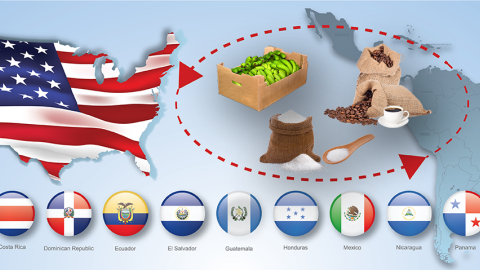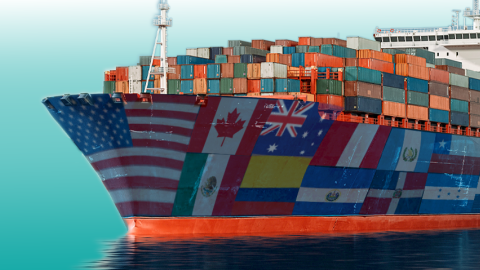Trade policies such as tariffs and nontariff measures (NTMs)—including technical barriers to trade (TBTs) and sanitary and phytosanitary (SPS) measures—affect the level of global trade. Negotiations to reduce these barriers to trade take place in various fora, including at the World Trade Organization (WTO), and in bilateral, multilateral, and regional trade agreements. The United States is a member of the WTO and is a signatory to trade agreements with a number of countries. Bilateral, multilateral, and regional trade agreements (to eliminate trade barriers among member countries) have proliferated in recent years as negotiations at the WTO have slowed.
ERS Research on Trade Policy and WTO-related Issues
ERS analyzes data on trade policy and WTO topics, and conducts economic research on the trade policies of major trading partners. This research provides U.S. negotiators and other stakeholders with an economic perspective on the complex issues affecting global agricultural trade and issues confronting the WTO.
Recent ERS reports with implications for international agricultural trade policy are summarized below.
- The Economic Impacts of Retaliatory Tariffs on U.S. Agriculture: In 2018, the United States imposed Section 232 tariffs on steel and aluminum imports from major trading partners, and separately, Section 301 tariffs on a broad range of imports from China. In response to these, six trading partners—Canada, China, the European Union, India, Mexico, and Turkey—responded with retaliatory tariffs on a range of U.S. agricultural exports , including agricultural and food products. The agricultural products targeted for retaliation were valued at $30.4 billion in 2017, with individual product lines experiencing tariff increases ranging from 2 to 140 percent. This report provides a detailed look at the impact of retaliatory tariffs by U.S. State and commodity, and estimates the direct export losses associated with the trade conflict.
- Potential Wheat Demand in China: Applicants for import Quota: ERS examines lists of applicants for a wheat tariff-rate quota (TRQ) for the years 2015 to 2021 to characterize the potential demand for imported wheat to China. More than 900 companies in China applied for the quota from 2015 to 2021, and 171 applied 7 years in a row.
- Reforming Market Access in Agricultural Trade: Tariff Removal and the Trade Facilitation Agreement: ERS analyzes two potential scenarios for reforming global agricultural trade—removing all tariffs or eliminating trade costs through the Trade Facilitation Agreement—and compares the scenarios' effects on trade, production, prices, and social welfare.
- China's refusals of Food Imports: Compliance with China's food standards and regulations can be a challenge for exporters aspiring to sell to China's growing food market. Refusals of imports fluctuate from year to year, peaking in 2007 and 2017 and dropping to their lowest-ever totals in 2018—19.
- Agricultural Market Access Under Tariff-Rate Quotas: ERS surveys the first 20 years of World Trade Organization members' tariff-rate quotas (TRQs) for agricultural products, providing data for an analysis of how TRQ market access for Agricultural products has evolved from 1995 to 2015 and the extent to which TRQs are fulfilling their goal of increasing that access.
- Tariff Reforms and the Competitiveness of U.S. Beef in Japan: Japan is one of the largest beef importers in the world and an important beef destination market for the United States. A 2016 ERS report examines how Japanese importers view U.S. beef vis-à-vis imports from Australia and other countries and how market access reform might affect Japanese beef imports from the United States.
- Alternative Policies to Agricultural Export Taxes That Are Less Market Distorting: Export restrictions could increase world prices for food commodities thereby exacerbating food insecurity and poverty among the world's poorest people. An ERS report has examined alternative policies to a conventional export tax that are less market distorting and welfare diminishing.
- Estimating the Effects of Selected Sanitary and Phytosanitary Measures and Technical Barriers to Trade on U.S.–EU Agricultural Trade: Non-tariff Measures (NTMs) (such as sanitary and phytosanitary measures and technical barriers to trade) have become among the most commonly cited barriers to agricultural trade. An ERS report found such measures to be significant impediments to agricultural trade in selected commodities between the United States and the European Union.



